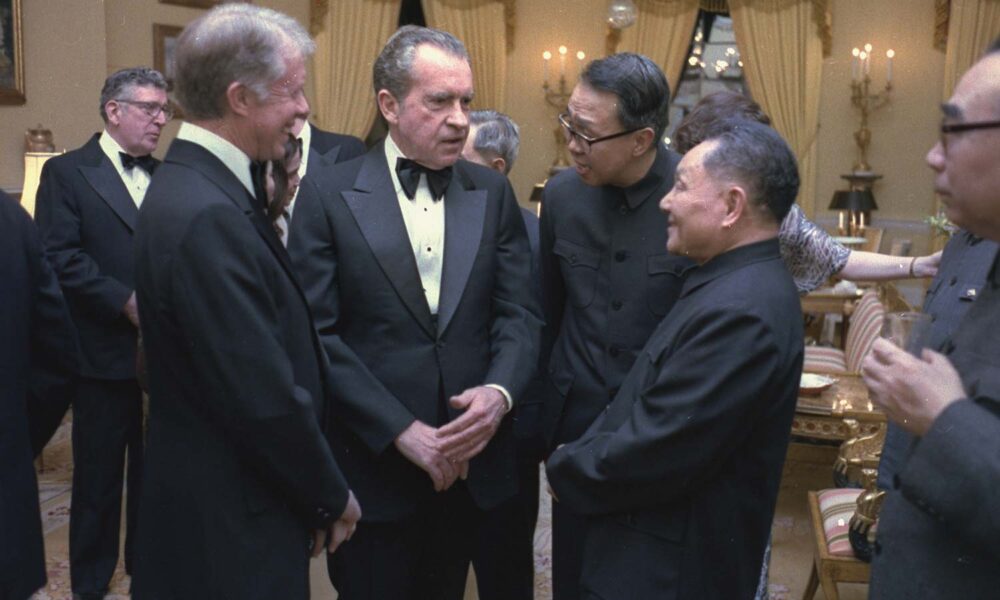Richard Haass, the president of the Council on Foreign Relations, recently called for a major change in US policy towards Taiwan. He wants the United States to provide the island with a guarantee of US military protection from China. He argues it is the best way to keep the peace. He’s wrong.
Threatening China doesn’t work
Haass believes threatening to use military force against China will prevent them from using military force against Taiwan. A look back at history shows this isn’t a wise tactic to employ. President Truman believed US threats to use force, including nuclear weapons, would keep China from intervening in Korea. He was wrong. President Eisenhower believed US threats to use force, including nuclear weapons, would compel China to stop fighting in Korea, and to stop shelling the Taiwan-held islands of Quemoy and Matsu. He was wrong twice.
Presidents Kennedy and Johnson confronted Chinese military involvement in Southeast Asia. But, like Truman and Eisenhower, they refused to recognize the communist government in Beijing or talk to its leaders. Their decision to opt for military escalation over dialogue prolonged the war in Vietnam without changing the outcome.
President Nixon finally admitted what his predecessors would not. Talking with China’s leaders was a better way to cope with problems than trying to coerce them.
China’s red line
Since the founding of the People’s Republic in 1949, the central problem in US-China relations has always been Taiwan.
When the talks began, Nixon quickly discovered that China’s position on the sovereign status of Taiwan was non-negotiable. After seven years of discussion, President Carter, in order to establish diplomatic relations, agreed that Taiwan is a part of China and that the United States would not support Taiwanese independence.
Carter also promised to meet three preconditions that, in China’s eyes, were necessary to prove the United States would keep its word. The first was to sever diplomatic relations with the Republic of China on Taiwan. The second was to abrogate the US defense treaty with Taiwan. And the third, and most often forgotten, was to “remove all US military forces and installations from Taiwan and the Taiwan Strait.”
In return, US negotiators asked the Chinese leadership to renounce the option of using military force to compel the authorities on Taiwan to accept unification with the People’s Republic. Chinese leader Deng Xiaoping made it very clear that China could not make such a promise. Deng reminded US national security advisor Zbignew Brzezinski,
“I told Secretary Vance that the Chinese side will not accept the proposal that the Chinese people should undertake the commitment to liberate Taiwan only by peaceful means because it is a matter concerning China’s sovereignty and an internal matter for China. … You can state your views but you should not make it a precondition.”
Carter chose not to make it a precondition and diplomatic relations were officially established in January 1979. Afterwards, however, the United States continued to seek an assurance China would not use force. During a visit to the White House Deng told Carter directly that the use of military force to compel reunification was a possibility if “the Taiwan authorities just absolutely refuse to talk with us.”
Moreover, Deng emphasized the Chinese leadership believed the threat of force was necessary to get the Taiwanese leadership to the negotiating table. “Please do not create a condition,” Deng warned, where the leader of Taiwan “thinks he has nothing to fear and thereby prevent negotiations.”
That’s exactly what the president of the Council on Foreign Relations is recommending.
Crossing the Rubicon
The current Chinese leadership sees the Taiwan problem the same way Deng did. It believes a peacefully negotiated resolution is not possible as long as Taiwan believes it enjoys US military protection. Chinese military exercises near Taiwan are intended to demonstrate that whatever the United States may do China is prepared to use force.
An explicit US guarantee of military protection is unlikely to stop China’s leaders from continuing to try to prove they can and will, if necessary, use military force to compel Taiwan to negotiate. The United States will inevitably respond by trying to prove it can stop them. The two nations will become trapped in an arms race. Tensions will increase. Allies will be anxious. Trade will suffer. Cooperation on other issues, like climate change, will become impossible.
The risk of war would never go away. Any peace obtained would be temporary, precarious and expensive. The only predictable outcome of taking Mr. Haass’ advice would be a steady stream of big business for US defense contractors.
A preferable alternative
Instead of wasting a fortune on a futile quest to dissuade China from pursuing its most vital national interest, the United States should actively seek a peaceful solution to the problem. It could work with both governments to find a way to satisfy China’s sovereign claim while permanently preserving the democratic rights of the Taiwanese people, who clearly have no desire to live under an oppressive communist government.
Reconciling these two requirements will be extraordinarily difficult. But a war is much less likely to occur as long as the parties continue to negotiate in good faith. Imagining a peaceful diplomatic solution to the Taiwan problem has never received any where near the same level of attention and effort as preparing for war. That’s a pretty good reason to hope a peaceful solution is possible.
The featured image in this blog is of Jimmy Carter, Richard Nixon and Deng Xiaoping during the state dinner for the Vice Premier of China on January 29, 1979. Source: U.S. National Archives and Records Administration.

